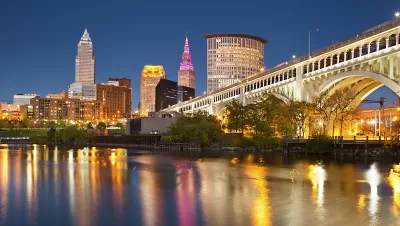A proposed measure would require developers receiving city incentives to provide more benefits to local stakeholders and increase local hiring.

City leaders in Cleveland want to require developers of big projects to offer more community benefits in exchange for tax breaks or other privileges. As Nick Castele reports in Signal Cleveland, the city council wants to ensure that projects create jobs and opportunities for local residents and contractors. According to City Council President Blaine Griffin, “it’s getting harder and harder to sell these big-ticket projects if people don’t see that they’re getting a return on their investment.”
Under the proposed legislation, developers receiving $250,000 or more in taxpayer incentives would be required to meet hiring goals for local, minority-owned, and women-owned contractors, offer apprenticeship and internship programs, and maintain communication with stakeholders, among other items. Projects costing over $20 million would have to adhere to additional requirements. “Those options include hosting job fairs, doing neighborhood infrastructure work and offering joint-venture opportunities to women- and minority-owned firms.”
Under the proposed measure, the city would also have to create a public dashboard identifying community benefits statistics. “The numbers on the board must include the revenue directed toward women- or minority-owned businesses and revenue to Cleveland residents, parsed by race and gender.”
FULL STORY: Council wants more community benefits from Cleveland construction projects

Maui's Vacation Rental Debate Turns Ugly
Verbal attacks, misinformation campaigns and fistfights plague a high-stakes debate to convert thousands of vacation rentals into long-term housing.

Planetizen Federal Action Tracker
A weekly monitor of how Trump’s orders and actions are impacting planners and planning in America.

In Urban Planning, AI Prompting Could be the New Design Thinking
Creativity has long been key to great urban design. What if we see AI as our new creative partner?

King County Supportive Housing Program Offers Hope for Unhoused Residents
The county is taking a ‘Housing First’ approach that prioritizes getting people into housing, then offering wraparound supportive services.

Researchers Use AI to Get Clearer Picture of US Housing
Analysts are using artificial intelligence to supercharge their research by allowing them to comb through data faster. Though these AI tools can be error prone, they save time and housing researchers are optimistic about the future.

Making Shared Micromobility More Inclusive
Cities and shared mobility system operators can do more to include people with disabilities in planning and operations, per a new report.
Urban Design for Planners 1: Software Tools
This six-course series explores essential urban design concepts using open source software and equips planners with the tools they need to participate fully in the urban design process.
Planning for Universal Design
Learn the tools for implementing Universal Design in planning regulations.
planning NEXT
Appalachian Highlands Housing Partners
Mpact (founded as Rail~Volution)
City of Camden Redevelopment Agency
City of Astoria
City of Portland
City of Laramie





























